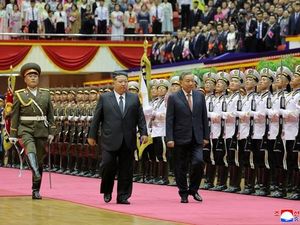Indonesia has taken a firm and highly publicized stance in the world of international sports, announcing that Israeli athletes will be barred from participating in the 2025 World Artistic Gymnastics Championships set to begin in Jakarta on October 19. The move, confirmed by Indonesia’s senior minister of law, Yusril Ihza Mahendra, on October 9, 2025, has ignited a storm of debate both domestically and abroad, highlighting the intersection of sports, politics, and global conflict.
The championships, scheduled to run from October 19 to 25 at the Indonesia Arena in Jakarta, had been set to welcome athletes from 86 countries, including Israel’s team led by 2020 Olympic gold medalist and defending world champion Artem Dolgopyat in the men’s floor exercise. Yet, despite earlier assurances to the Israeli Gymnastics Federation that the team would be welcome, Indonesia’s long-standing policy of refusing entry to Israeli sports delegations has prevailed.
Minister Mahendra made the government’s position crystal clear in a video statement: “The government will not grant visas to Israeli gymnasts who intend to attend the World Artistic Gymnastics Championships in Jakarta.” He further explained that the decision aligns with previous directives from Indonesian President Prabowo Subianto, including his recent speech at the United Nations General Assembly, where he strongly condemned Israel’s continued attacks on Gaza.
Behind this decision lies a complex tapestry of historical, political, and humanitarian factors. Indonesia, the world’s most populous Muslim-majority nation, has been a staunch supporter of the Palestinian cause for decades. The country’s refusal to host Israeli delegations dates back to the 1962 Asian Games, when both Israel and Taiwan were excluded from the Jakarta event. Since then, Indonesia has consistently drawn a line, asserting that “no sporting event should legitimize an apartheid state,” as Muhammad Zulfikar Rakhmat, a researcher at the Center of Economic and Law Studies (CELIOS), put it.
The current controversy erupted after the Indonesian Gymnastics Federation initially submitted a sponsorship letter for six Israeli athletes to obtain visas. However, in the face of mounting opposition from politicians, moderate Muslim groups, and a deluge of outraged social media commentary, the federation withdrew its sponsorship. Minister Mahendra confirmed, “the federation has withdrawn the sponsorship letter.”
Calls to exclude the Israeli team grew louder in early October, as the humanitarian crisis in Gaza escalated and public sentiment in Indonesia became increasingly charged. Jakarta Governor Pramono Anung captured the prevailing mood, stating, “Their presence would obviously spark public outrage in such a situation.” He added that the arrival of Israeli athletes would cause “deep emotional distress to the majority of Indonesians,” given the ongoing conflict and suffering in Gaza.
Indonesia’s highest Islamic authority, the MUI, added its influential voice to the debate. Amirsyah Tambunan, MUI Secretary General, declared, “By refusing to allow Israeli athletes to compete in the sporting arena, we want to state that all forms of colonialism must be abolished because they are contrary to humanity and justice.” The MUI urged all communities supporting Palestinian independence to advocate for the exclusion of the Israeli team.
The timing of Indonesia’s decision is particularly notable, coming despite a ceasefire between Israel and Hamas. The global backlash against Israel’s actions in Gaza—where, according to reports, at least 67,194 Palestinians, predominantly women and children, have been killed—has spilled over into arenas far beyond politics, affecting international sports and cultural events worldwide.
Israel’s growing isolation on the international stage is evident. The Israel Premier Tech cycling team recently announced it would drop its Israeli identity from the 2026 season, following repeated pro-Palestinian protests and mounting pressure from sponsors. The team’s decision came after being excluded from a race in Italy and facing disruptions at the Spanish Vuelta, highlighting how sports organizations are grappling with the fallout from the conflict.
Soccer has also felt the impact. Israel’s upcoming World Cup qualifying match in Italy is expected to draw more pro-Palestinian protesters outside the stadium in Udine than ticket-holding spectators inside. This echoes the controversy from 2023, when Indonesia was stripped of its hosting rights for the Under-20 FIFA World Cup just two months before kickoff, after refusing to allow Israeli teams to participate.
The current gymnastics controversy is thus part of a broader, ongoing debate about the role of sports in international diplomacy and human rights. Critics of Israel argue that the country should be sidelined from international competitions, drawing parallels to Russia’s exclusion from global sporting events following its invasion of Ukraine in 2022. Supporters of this approach believe that denying Israel a platform in sports sends a powerful message against its policies in Gaza and the occupied territories.
Yet, the situation is far from straightforward. The Israeli Gymnastics Federation, which had been assured in July 2025 that its athletes would be welcome, did not immediately respond to requests for comment. The reversal by Indonesian authorities has left the Israeli team’s participation in limbo, despite months of preparation and anticipation.
The controversy has also sparked debate within Indonesia about the intersection of sports and politics. Some argue that international competitions should remain above political disputes, fostering unity and understanding among nations. Others maintain that allowing Israeli athletes to compete would contradict Indonesia’s core values and longstanding support for Palestinian rights.
“That stance was never about pettiness or isolationism, it was a reflection of Indonesia’s conviction that no sporting event should legitimize an apartheid state,” emphasized Muhammad Zulfikar Rakhmat of CELIOS. These words resonate with many Indonesians who view the decision as a principled stand, rather than mere political posturing.
As the opening ceremony for the 2025 World Artistic Gymnastics Championships approaches, the absence of the Israeli team is set to cast a long shadow over the event. The championships, meant to celebrate athletic excellence and international camaraderie, have instead become a focal point for the world’s deepening divisions over the Gaza conflict.
For now, all eyes remain on Jakarta, where the global gymnastics community gathers amid tension and uncertainty. The Indonesian government’s decision has ensured that the intersection of sports and politics will remain front and center, at least for the duration of the championships. Whether this move will set a precedent for future international sporting events remains to be seen, but one thing is certain: the debate over who gets to compete—and under what circumstances—has only just begun.





